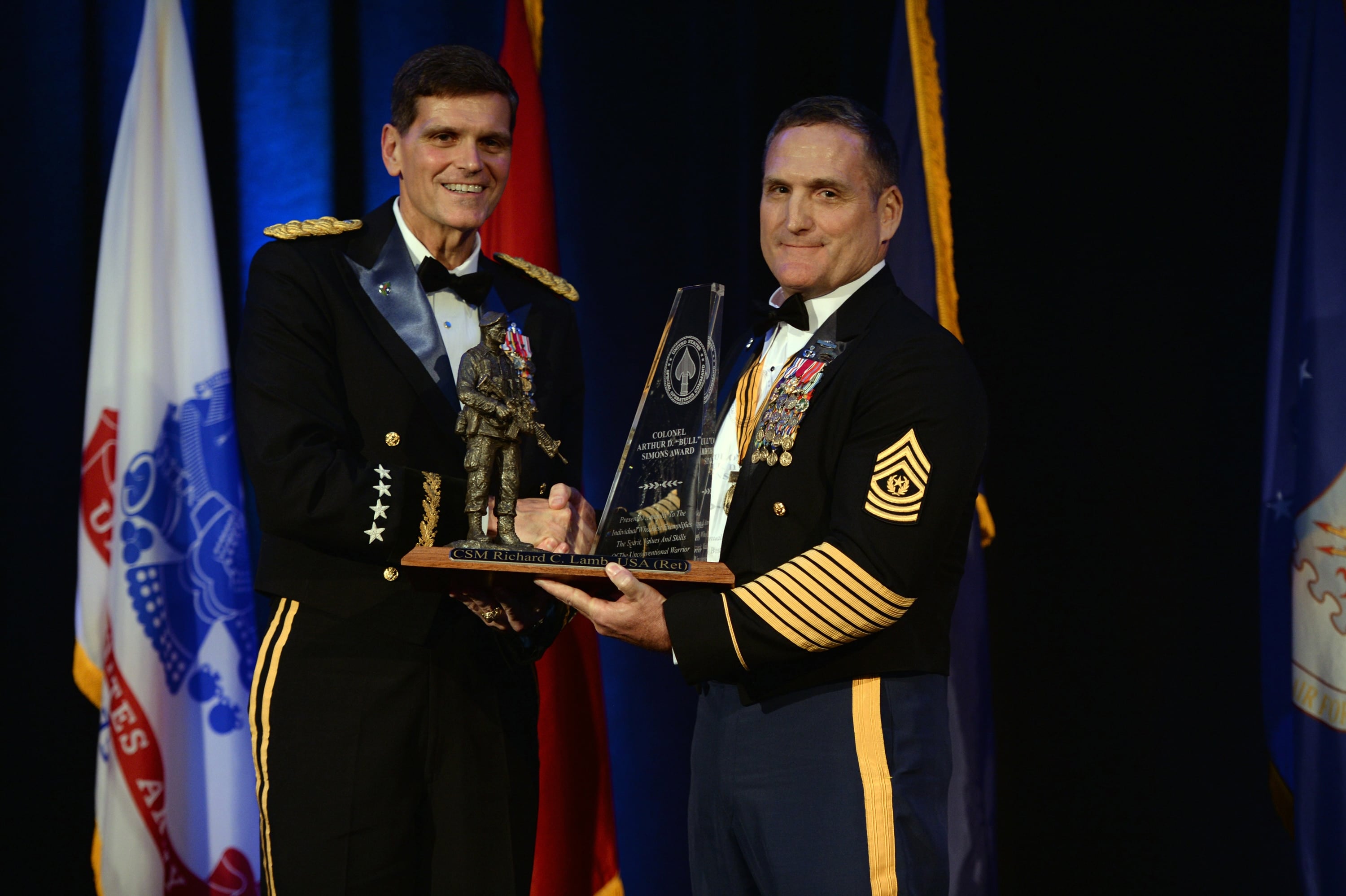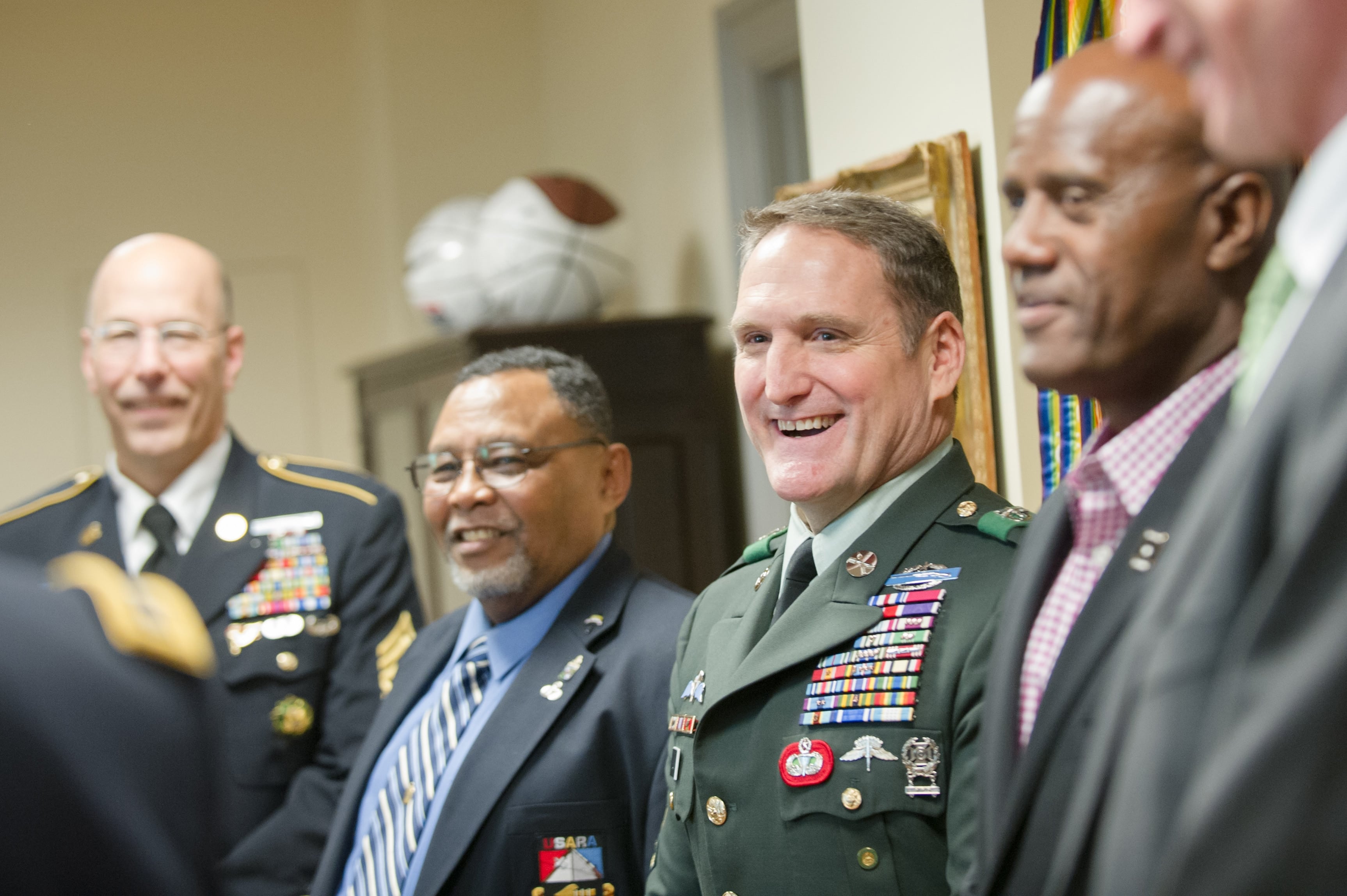Editor's note: This is the second in a series of stories detailing valor awards for service members whose heroism was overlooked at the outset; whose awards were lost, or never received by family members; or whose actions otherwise fell victim to some type of oversight. For more stories of heroism, past and present, visit our searchable Hall of Valor database; the hall's curator, Doug Sterner, assisted in story selection and research.
The men: Four soldiers with Joint Security Force Company, United Nations Command Security Force, the unit responsible for securing the North Korea-South Korea border.
The moment: On Nov. 23, 1984, the day after Thanksgiving, a Soviet citizen on a North Korea-sponsored tour of the demilitarized zone sprinted toward, and then over, the Military Demarcation Line. North Korean troops reportedly fired on the man, then pursued him over the border, drawing a response from U.N. forces, including U.S. soldiers.
Soldiers assigned to a quick reaction force at nearby Camp Kitty Hawk got the order to "load trucks — this is for real," recalled then-Pfc. Mark DeVille.
Armed with an M16 rifle and a .45-caliber handgun, DeVille remembered giving the pistol to a new South Korean soldier in his truck who'd yet to receive permission to carry a firearm.
("I shouldn't have done that," DeVille said, "but I wasn't going to leave a man in a firefight without a weapon.")
As he and fellow QRF member Richard Lamb, then a staff sergeant, took part in a movement to encircle a North Korean platoon that had dug in on the site of a yet-to-be-completed swimming pool, they happened upon the reason for the whole engagement.

Retired Command Sgt. Maj. Richard Lamb, right, receives the 2015 U.S. Special Operations Command Bull Simons Award from Army Gen. Joseph L. Votel, then-head of SOCOM, in 2015. Lamb was one of four soldiers who received Silver Stars in 2000 for their actions in Korea 16 years earlier.
Photo Credit: null
"Lamb saw the defector hiding in the grass," DeVille recalled. " ‘He’s right there!’ he said. I didn’t see anybody. It’s a good thing he wasn’t a North Korean. I’d have been dead."
The man was escorted to safety. The cease-fire order came before the encirclement, DeVille said, and the North Koreans were allowed to cross back into their homeland. Three North Korean soldiers died during the incursion, as did Cpl. Jang Myung-ki, a South Korean augmentee serving with U.S. forces. U.S. Army Pfc. Michael Burgoyne was wounded in the incident.
The medals, Part I: For his actions, DeVille recalled receiving an Army Commendation Medal with "V" device. Others in his unit received similar honors, but "they tried to downplay the whole thing," he said.
A possible reason for that, one which was highlighted in several pieces by Baltimore Sun reporter Tom Bowman more than a decade after the incident, resulted from the U.S. invasion of Grenada in 1983. Army officials were criticized for awarding more medals for actions taken during the invasion than there were soldiers who took part in it.
But in 2000, the Army awarded Silver Stars to Lamb, DeVille, Bert Mizusawa and John Orlicki for their roles in the incident. Orlicki was a specialist in 1984, and Mizusawa a captain — he would reach the rank of major general, and eventually would serve as the assistant to the Joint Chiefs of Staff for reserve matters.
The medal, Part II: DeVille left service in 1988, re-entered and left again in the early 1990s, he said. When Army officials sought him out to deliver his Silver Star, they came up empty — at least in part because of a clerical error that had researchers looking under the wrong Social Security number.
"If I owed the Army money, they would've found me," DeVille joked.
Instead, after discussing his service with a co-worker, the friend prompted DeVille to do a web search on himself — and not just with his name, but with qualifiers such as "Army."

Former platoon members of Mark DeVille participate in a January 2014 ceremony to present DeVille with a Silver Star, the nation's third-highest military award, for his actions in Korea in 1984.
Photo Credit: PO1 Daniel Hinton/Navy
DeVille soon found his name in the Hall of Valor database, next to a Silver Star. Not me, he thought, until a friend prompted him to read the citation.
"I clicked on it, read it, and said, 'Yeah, that's me,' " he said.
He found Hall of Valor curator Doug Sterner, Sterner found the now-general-officer Mizusawa, and Mizusawa went to his boss, JCS Chairman Army Gen. Martin Dempsey, to see about a ceremony. Dempsey wanted to present the award himself; many former platoon members, including Lamb, attended a January 2014 event at the Pentagon.
"They tried to get together all the people that they could," DeVille said. "I was surprised that they didn't just put it in a box and mail it to me."
Key quote: "None of us felt that we should've got medals," DeVille said. "We didn't feel that we deserved any medals. We were just doing our job — doing our job as trained."
For more, read the first entry in the Forgotten Valor series: The Civil War officer whose Medal of Honor came 150 years after his death
Kevin Lilley is the features editor of Military Times.




